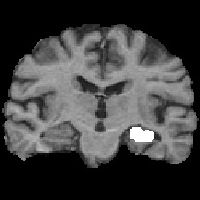
Alzheimer’s Disease (AD) is not detected clinically until relatively late in its progression, and the drugs that exist to slow the disease progression might be more effective if they are administered early on. The goal of this project is to use computer vision techniques to help detect the disease earlier on by analyzing the shape and size of compartments in the brain.
In particular, our work focuses on a section of the brain called the hippocampus. It is known to shrink and change shape over the course of the disease. Together with collaborators at the Alzheimer’s Disease Research Center at the University of Pittsburgh Medical Center, we are working to develop techniques for reliably isolating the hippocampus in medical images, then predicting risk of AD based on the shape and size properties of the hippocampus. In so doing, we aim to give doctors another source of information in their overall assessment of whether a patient might have contracted AD.
current staff
past staff
- Howard Aizenstein
- Jim Becker
- Steven DeKosky
- Yanxi Liu
- Oscar Lopez
- Carolyn Meltzer
past contact
- Yongming Li
